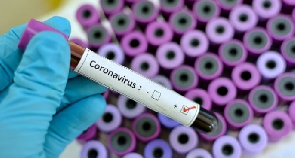 Ghana's coronavirus cases keeps rising
Ghana's coronavirus cases keeps rising
Pressure group OccupyGhana has called on the government to immediately ban all social gatherings in the country due to the increasing numbers of COVID-19 cases.
According to the group, the ban is important to slow the spread of covid-19 across the country.
“The factor(s) driving these unfortunate changes are not letting up, and unless something drastic is done, the situation will get worse. These factors leading to the uptrend are visible to most Ghanaians.
“After almost a year of dealing with this disease, we have all learned the role social gatherings play in spreading. We, therefore, ask the government to immediately ban all social gatherings till a marked drop in new cases is seen.”
Ghana has now recorded over 3500 active cases with the death toll currently at 361. The country is currently recording almost 600 cases on a daily basis.
Find below the full statement
25th JANUARY 2021
OCCUPYGHANA® PRESS STATEMENT
UPTICK IN NEW COVID-19 CASES AND DEATH – GHANA NEEDS TO ACT AND ACT FAST
The Medical Team of OccupyGhana® has been studying graphs plotting new cases of COVID-19 against time, and sees a relative period of quiescence from late August through much of October 2020.
In the first week of November, though, there was a noticeable spike in new cases that let up about two weeks later. A similar phenomenon was evident as we entered December. Though new cases were more than what was seen in September and October, the growth rate stayed stable.
However, January 2021 has seen a significant uptick in new cases and death. These changes are not letting up three weeks into the month. The uptrends in new cases and deaths are noticeable and more significant this time than back in November and December 2020.
OccupyGhana® therefore states as follows:
1. The factor(s) driving these unfortunate changes are not letting up, and unless something drastic is done, the situation will get worse. These factors leading to the uptrend are visible to most Ghanaians. After almost a year of dealing with this disease, we have all learned the role social gatherings play in spreading. We therefore ask the government to immediately ban all social gatherings till a marked drop in new cases is seen. This will include funerals, parties, church services, night clubs etc. In short, any gathering of more than ten people should be banned again.
2. Unfortunately, a ban might affect the recent and pending re-opening of schools. It will therefore be imperative to explore expanding online classes, whether class sizes of those who cannot take online classes could be reduced to a maximum of ten, and shift systems introduced. For parents who must go to work, it is time for employers to begin conversations on ‘flexitime,’ which breaks the day into three 8-hour cycles where parents could stay at home to supervise online classes and then report to work later in the day. We must do whatever it takes to rein in this trend of infections, and it requires us to be creative in how we think and how we do things.
3. It is our view that the experience from last year showed that a general lockdown is not sustainable. A better alternative, we think, would be to identify and target the hotspots and at-risk groups and explore ways to modify their behaviour. It is unfortunately evident that the social behaviour of those in the middle class is driving this new uptick in cases and deaths. All efforts should be made to influence this behaviour and reverse this trend.
4. Enforcing the mask mandate is also very important. Masks have been shown to break the spread. We must enforce the terms of the Imposition of Restrictions Act, 2020 (Act 1012). However, we think that the punishments in the Act have hardly been applied. This is because although the prescribed fine of between GHS12,000 and GHS60,000 and/or imprisonment between 4 and 10 years might have been well-intentioned to be draconian and convey the seriousness of the situation, they have proven to be unrealistic. Parliament has to consider an amendment of the Act in this light, to aid its enforcement and to provide for realistic fines and other deterrents such as community service for those who breach the law.
5. In the general public, there are still many misconceptions about the disease. Re-educating the public about the disease, the myriad ways it can present and its short and long-term effects should be an exercise our media houses can help with. We are inviting electronic media houses to commit to air approved educational advertisements on the pandemic for a minimum cumulative period of one hour in every 24-hour cycle, over the next month. Print media houses may also commit to print one full-page advert three times a week.
6. Another factor leading to the uptrend is the new variants of SARS-CoV-2, the virus responsible for COVID-19. Consideration should be given to reducing travel to and from countries where these variants are dominant.
7. We also ask the government to make more hospital beds available as all indications point to a dire need for beds for the ever-increasing number of new cases that need in-patient care.
8. Ultimately, the best way out of the chokehold of this pandemic is a vaccine. Therefore, we implore the government to spare no effort in getting doses of a COVID-19 vaccine for the country.
9. To all Ghanaians, even if you are one of those who will only get a mild case of COVID-19, the toll those who suffer the severe version exact on the health facilities ultimately lead to a situation where help for non-COVID conditions become very difficult or even impossible to obtain. The indirect effects of the disease and a rampant spread are many. Therefore, it behoves us all to work to stop the uptrend in cases.
In conclusion, it is essential for all to recognise the direness of the situation and act accordingly.